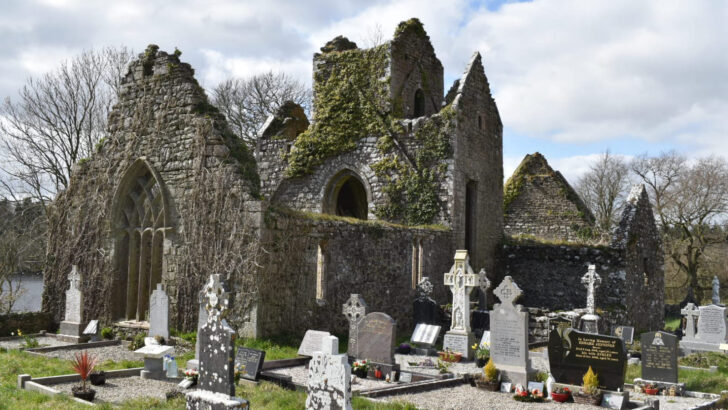Notebook
If you pray the Angelus on a Sunday evening while watching RTÉ you will be familiar with the Abbey of Ballindoon. Each Sunday this wonderful structure acts as the backdrop to the ringing of the bells calling us to prayers.
Recently I was invited by Fr Cullen and the parish of Geevagh in Co. Sligo to celebrate Mass in the remains of the old Dominican priory at the beautiful Abbey of Ballindoon. It is the last of the Irish Dominican medieval houses to be founded, in 1507, and was presumably one of the Observant Friars convents, living a strict religious life as part of the network of Connacht houses. The Dominicans who lived there were men strong in faith, seeking only the things of the Lord and focusing their lives on welcoming others into the same supernatural life of grace by means of their preaching.
Henry VIII’s reformation, commenced in 1534 with the passing of the Act of Supremacy and the dissolution of religious houses began in 1536, less than 30 years after construction had begun at Ballindoon. While the Act of Supremacy applied equally to the Church in Ireland, initial confiscations were much more successful in England and Wales. It was not until 1603 under James I that the Dominicans were forced to leave the abbey. The land passing into the hands of those more in line with government thinking.
The Dominicans might have lost the property but they continued to serve the sacramental needs of the local people, no longer from a great abbey but from a tiny log cabin in the midst of the local bog called Friarstown, about two miles from the Abbey. For over 150 years, until 1760, the seclusion afforded by the abode in Friarstown preserved the community allowing them to minister to the local area from this cabin. In 1702 there were two friars in hiding, 1756 there were three, in 1760 there were five. This little group continued in the midst of persecution and poverty until, the greed of a local Catholic landlord forced them to leave. It appears that, being financially destitute the small Dominican community were unable to pay the rent demanded for the small piece of reclaimed land surrounding their log cabin, their cattle were seized by the landlord and they were compelled to abandon their home and their people. The glorious story of the Dominicans in this beautiful area of Co. Sligo was ended not by persecution but by a fellow Catholic’s avarice.
Maybe this part of the story of the Dominicans in and around Ballindoon is more important for us Catholics in the Ireland of today. Rather than the story of the glory days of the abbey with its magnificent rood screen but the story of a local Catholic landlord who for money forced the Dominicans to abandon their mission, needs to be the focus of our attention. What the English troops, poverty and persecution failed to do, the desire for the things of this world in the heart of a Catholic landlord, brought the story of the Dominicans of Ballindoon to an end.
30 years married
Recently I was at a celebration marking 30 years of the marriage of friends of mine. One of their daughters had come back to Ireland from the continent for the weekend. Needless to say, she had told her work colleagues why she was going home for the weekend. She soon discovered their amazement that her parents could still be married and living together after 30 years. None of them came from families where their parents were still together. These work colleagues, all in their early 30s, came from all over Europe. What does that tell us about the future of our civilization if marriage and the family is meant to be the basic building block of society?
A blessed future…
Recently I attended the annual summer festival of Youth 2000 in Clongowes College. I want to thank all the wonderful volunteers who give of their time, talents and energy to mission of youth bringing youth to the heart of the church. Seeing such goodness in these young people reassures me of the blessed future of the Catholic mission in Ireland.


 Ballindoon Abbey on the shore of Lough Arrow in Co. Sligo.
Ballindoon Abbey on the shore of Lough Arrow in Co. Sligo. 